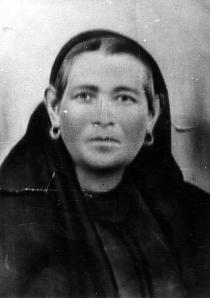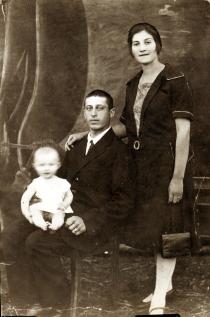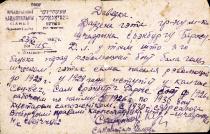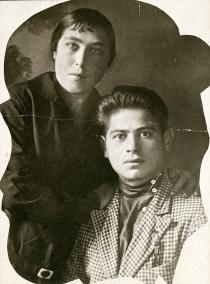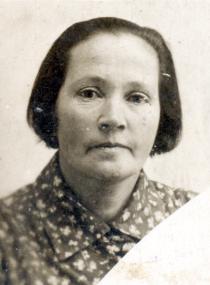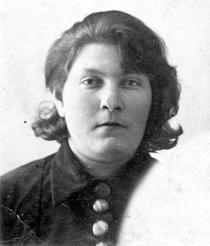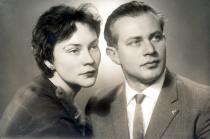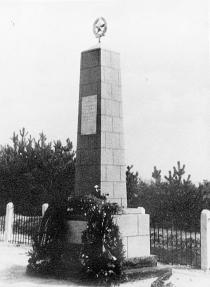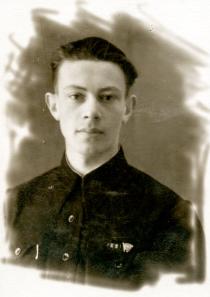
Grigory Erenburg
St. Petersburg
Russia
Interviewer: Ludmila Liuban
- My family background
I was born in 1927 in the Jewish borough of Shzedrin, of Parichsky district, near Bobruisk, in Belorussia. My ancestors were Ashkenazi Jews, some of them from Lithuania. All of my grandparents lived in Belorussia. I also remember my great-grandfather on Father’s side, the father of his mother. His name was Zavl, and he lived 106 years. He was a strong, sturdy old man, rosy-cheeked and blue-eyed. He used to make brooms of twigs for people in Shzedrin. There was not much work in the borough, and that is why nobody ever infringed upon his “daily bread.”
He died in the 1930s. His son, my grandfather on the paternal side, David Leib Erenburg, was born in the 1870s. He lived in Shzedrin; he kept horses and was a cabman by trade. He loved horses very much. He carried both cargo and passengers, for instance, to Parichi, a town on Berezina River. In 1929, he joined the collective farm “Sotsveg” (Socialistic Way), one of the first Jewish collective farms in the country, which was organized in Shzedrin in the 1920s.
Just like all Jews of Shzedrin, where the majority of inhabitants were hasids, David was a faithfully religious man. Every day he prayed in synagogue. When I grew up a little, he took me with him to synagogue. I remember him putting on a tallit; he always wore a small tallit under his clothes. Before his prayers, he put on tefillin.
My grandmother Dveira was born in Shzedrin in 1871. She was a housewife. She was an illiterate woman who understood neither Russian nor Belorussian, and spoke only Yiddish. She, just like my grandfather, was religious. The family kept all Jewish traditions – kashrut, Shabbat and celebrated every Jewish holiday. On Friday, they made fire in their stove at lunchtime, and cooked delicious food for Saturday.
The lamp light was turned on and off by children, as they were innocent. It was the same in every other house of the borough. If a family was very poor, the Jewish community provided it with support. If a man was traveling at the time, or was a student, he could be hosted by some Jewish family. On holidays, particularly on Passover, special beautiful dishes were used; we stored them in the attic. There were such dishes in every house, and poor ones were not an exception.
Grandmother Dveira kept the house and brought up the children. She bore many children, but boys died in infancy. Altogether, five children survived. The elder daughter left for America in the 1920s; her husband was a construction worker. She lived until very old age, and in 1969 she came to the USSR to see us. There were more three sisters: Shima Lea (Sima), Perla and Frada. My father, Berl (Boris), was the only surviving son.
Grandfather David and Grandmother Dveira in 1936 moved to Bobruisk. They had a house of their own, with a big garden. Grandfather did not work then; the children supported them. He did not go to synagogue every day; he often prayed at home, because he was old, and the synagogue was far from home. But all Jewish traditions were kept in the house.
My grandfather on my mother’s side, Herz El, was grandfather’s David contemporary, and was also born in Belorussia. He was a musician; he played the trumpet at weddings. He lived with his family in Shzedrin. He died in 1909 of tuberculosis.
His wife, Khaya Gita El, nee Ekelchikle, was born in 1870s, supposedly in Lithuania. She did not get any education. She kept the house and brought up the children. After the death of her husband, she was left alone with eight children. To earn her living, she worked for the rich Jews. One of her occupations was to make down by plucking goose feathers. They were flying everywhere. Down sold well; even the poorest Jews in Shzedrin slept on down pillows. Grandmother also made cereals, lokshen and farfel.
Grandmother Khaya was a very benevolent person, an optimist, always trying to be good to people. Like other Shzedrin inhabitants, she was religious. Her native language was Yiddish, though she knew Russian and Belorussian, too. All Jewish traditions were kept in the house; she went to synagogue every Friday.
Her two eldest sons and daughter Elka went to America in 1924. Her son Аron perished during the Civil War, as a soldier in the Red Army. There were four other children: Iosif and three daughters – Henda, Hava and Rachel, my mother. Grandmother died before the war, in 1938, and was buried in Shzedrin.
My parents stayed in Shzedrin. They had known each other since their youth, and had gone to dancing parties together. It was in this little town that my grandfathers and grandmothers, uncles and aunts lived. I also was born in Shzedrin. The lives and the deaths of many a member of our family were connected with this Jewish settlement.
Shzedrin has a very interesting background. The village was not far from Bobruisk. The czar, Nicolas I, often came to Bobruisk to supervise the reconstruction of the military fortress. During one of his visits, somewhere in 1840s, the local authorities had issued an order for beautiful young women to stand along the route of the cortege as it passed. There was a rumor that Jewish girls had also to “serve” the officers in the barracks. Jews of Bobruisk became seized with terror. To protect their daughters, they disfigured them; the mothers shaved and tarred their daughters’ heads.
When a young officer from the czar’s retinue approached Esterka, a young and beautiful girl, and asked for her name and address, it became clear they had to flee. That night Esterka and her father, masked as beggars, secretly left town, but almost ran across that officer as he was walking to their door.
In the 19th century, the Russian government was trying to colonize lands with Jews. For this, the government granted an important benefit: exemption from army service. In 1842, the 40 Jewish families living in the Bobruisk vicinity bought 600 desyatina of land from a local landowner, including the village of Shzedrin. They were hasids, and the purchase was registered in the name of the Lubavitcher Rebbe, who became an honorary citizen of Shzedrin.
The majority of Jews were occupied with agriculture, others were in trade – sales of wood. Later, many craftsmen arrived. In 1897, according to the population census, about 4,022 people lived in the borough. There were seven synagogues in Shzedrin, and even a Talmud Тоrаh. Because Lubavitch hasids were the majority of population, there also was a Lubavitch yeshiva in the borough.
The revolution of 1905 touched Shzedrin. There were local organizations of various parties: the Bund, Poalei Zion, Social Democrats – there were even anarchists. In 1918, Shzedrin was occupied by the Germans; when the Germans left, they were replaced by the Poles. But still, the borough was developing, little by little. Our library, which existed since 1905, formally became an official library.
It had about 600 books in Yiddish, Hebrew and Russian; lectures were held there. A four-year school was opened; it was one of the first in Belorussia where the instruction was in Yiddish.
In the late 1920s one of the first successful Jewish collective farms was founded. I remember this collective farm where my grandfather David worked since 1929. The farm was rich; there were lots of fields, gardens, a goose farm, a canned-food plant, and a dairy factory.
But the population of the borough began to decrease. The youth went to the city to study; many people, and our relatives among them, left for America. A population census in 1931 showed there were 2,021 people living in Shzedrin. Before the war, there was no electricity; no water supply in the borough. The roads were mostly unpaved. There were no cars; people traveled on horses.
My father, Boris Davidovich Erenburg, was born in Shzedrin in 1907. The family was poor. He became a shoemaker’s apprentice very early. At the age of 16, he started to work on his own. As there was not much work in Shzedrin, he worked in the adjacent villages. He came to a village, collected orders, lived with one family, then with another where he worked.
Those were Belorussian families, but meals were cooked for him separately, because he ate only kosher food. He was a good shoemaker, and he was paid for his work in kind. On Fridays, he used to return to Shzedrin and go to synagogue.
My mother, Rachel Herzevna Erenburg (nee El), was also born in Shzedrin in 1907. She graduated from a Jewish elementary school. In her youth, she helped her mother around the house; in the vegetable garden; worked for the rich Jews, as day labor; for the candy factory; and even as a hairdresser. But one day, clippers had stuck in the client’s hair, and she quit the job. She was hard-working, joyful and sang well – everyone used to sing in her family – and acted in an amateur theater.
Mother’s sister Henda, born in 1905, was a housewife. Her husband worked in the supply business, and they had two sons. They lived in Vetka. The elder, Herz, was a student in Gomel, and he was in love with a Russian girl. When the war started, he joined the partisans. When Herz came back to Vetka, his beloved betrayed him, and the Germans shot him. Henda with her husband, Haim, and son Alexander, born in 1930, were evacuated to Asia, where she died in 1943. Alexander later graduated from Gomel Institute of Law, worked as a deputy director of a large enterprise, and died in the 1980s. One of his sons heads a construction company; the other is a pediatric surgeon. Both of them reside in Gomel.
My mother’s other sister, Hava (Eva), was born in 1910. She was a housewife, and her husband was an electrician. They lived in Bobruisk, in a house with us. They had three children; the last child had been born a week before the war. The husband was called up to the army, and was killed shortly after. Hava and the children moved to Shzedrin to stay with her brother Iosif.
Iosif, born in 1930, was a cutter, and lived with his family in Shzedrin. His wife, Hava, was a housewife, and they had four children. Their elder son was enrolled in a military college in 1940. He went through the entire war as an officer, was twice injured, and was demobilized with the rank of major in the 1950s. His son became an engineer and now lives with his family in Nizhnevartovsk.
Khaya, Iosif’s wife, with Aron, her younger son born in 1938, had also escaped. Before the war they went to Crimea, to visit Khaya’s sister, and that saved their lives. During the war, Khaya was a cook in a military college evacuated to Karelia. Hava, with her three children, and Iosif, with his two sons, were shot by Germans in Shzedrin in 1942.
- Growing up in time of war
After my parents married in 1926, my mother was a housewife. I was born in 1927. In 1930, my father left for Bobruisk, got a job in a plywood manufacturing plant, and in 1931 brought his family to Bobruisk. First they bought a small house in the outskirts. Mother kept a cow, and all the milk was for sale. They saved the money, and in 1934 they bought a big house in the center of the city. There was a goat too, and everybody drank goat’s milk.
There were four children in our family. I was the eldest. I turned 14 before the war. My brother Iakov was born in 1931, sister Olga, in 1935, and Eugenia in 1939. Though we lived a modest life, we were a united and jolly family. All Jewish traditions were observed, but Mother and Father went to synagogue only on Yom Kippur.
Our home was large and open to all relatives and friends. Father had lots of acquaintances in the Belorussian villages around Shzedrin, from the time he worked there as shoemaker. His friends from the villages used to come to Bobruisk and stay with us. One of his friends asked Father to house his daughter Frosya two years before the war. She found a job on a garment factory, and lived with us.
When the war started, Bobruisk was almost instantly bombed. The authorities ordered everybody to leave the town. We went to Shzedrin by foot, but Germans arrived there very soon. Not to trouble our relatives, we decided to return to Bobruisk, where we had left all our belongings. Daddy went first. Frosya was the next to go, to gather her things.
She came back and said that our house was intact, that Father was all right, that he had found a job and was receiving a good ration and wanted us to join him. And so we all – my mother, brother, little sisters and grandparents walked to Bobruisk. But it turned out that Frosya had deceived us; her father had become a policeman for the Germans. Our home had been robbed, Father had no job, and Jews were ordered to wear yellow stars on their clothes. We were not permitted to communicate with Belorussians. Father was very scared when he saw us.
That was in August. The first execution of Jews took place on September 9, 1941, when Germans killed all the men. When they arrived in our house, Father was lucky to escape and hide in the shed. I, a boy, was left alone. But Grandfather David, who was praying at that moment, was dragged out of the house and killed. From that day we hid Father in the shed. At the end of September, some peasants came from the village to take away old or sick horses. They had a pass for 12 persons, and they were only 11. We managed to convince them to take Father with them. He was a blonde and didn’t look Jewish. But Father refused to go; he stayed in Shzedrin.
On October 22, the Jews of Bobruisk were ordered to move to the ghetto – the territory of a destroyed aerodrome – within three days. Our family and five more families lived in one 25-meter room, one-third of which was occupied by our belongings. The ghetto was surrounded with a barbed-wire fence and the guards would shoot to kill if someone tried to escape.
On October 25, the last day that Jews were allowed to appear in the city, a Russian peasant we knew came to us, and Mother persuaded him to take me with him. I, like Father, did not look Jewish. The peasant did not have children, and he offered to let me stay with him and pass myself off as his nephew from Western Belorussia. But I fled to my father in Shzedrin.
We hoped to free Mother and the children from the ghetto somehow, but on November 7, the Germans shot 30,000 Jews from Bobruisk, including Mother, Grandmother, my little brother, sisters and our other relatives.
In Shzedrin, the Germans organized a ghetto, too, where Jews worked, particularly in mechanical workshops, to supply the German army. People lived in their own houses. Shzedrin was not fenced with barbed wire, but Jews had no right to leave, otherwise, the Germans threatened to kill the other Jews who remained captive in the ghetto.
Father and I were permitted to leave sometimes and earn a little by our shoe business in the neighboring village of Kitin, and in the evening we would return and check in at the commandant's office. Our earnings were divided among our relatives; everyone was starving in the ghetto.
On March 8, 1942, the Germans began to shoot Jews of Shzedrin. The fascists took the inhabitants of the ghetto to the cemetery. They made the people get into ditches that had been dug earlier, then they shot them and covered them with earth. That day we were in Kitin. The policemen allowed us to remain there till morning and assigned two guards to watch us. We played cards with them. Then I asked permission to go to the toilet outside, and Father had come out with me – and without our coats, we ran away.
We tried to get help in some houses, but peasants were afraid to hide us because they would have been shot immediately, along with their families. But we were given some clothes. The last man we spoke to appeared to be a partisan messenger. He told us how to get to the Rudobelsky partisan area. We reached there by a miracle. None of the Jews in Shzedrin survived; about 1,500 people were executed.
From March 10, 1942, till June 26, 1944, Father and I were in the partisan group. I fought in battle; Father was a shoemaker. I was a well-read young man, wrote partisan leaflets, listened to the radio, copied reports. The destiny of partisan area itself was awful. The fascists almost burned it out, together with the inhabitants of eight or nine villages. I shall never forget mountains of smoking corpses, children with their heads cut off, women with their stomachs ripped open. The partisans broke into small groups. We lived in a bog surrounded by Germans, starved and frozen.
When we merged with the Red Army, the groups were disbanded. Those fit for service wear taken to the army. Father and I returned to Shzedrin, where Father organized a footwear and sewing guild, and I was enlisted in a fighting brigade, which was capturing German policemen in the woods.
The destiny of almost all our relatives, my uncles and aunts both on Mother’s and Father’s sides, is tragic. My father’s sister Shima Lea, born in 1904, was a housewife; her husband was a mechanic at a sewing factory. They lived in Bobruisk before the war and had three children. Her husband perished in the beginning of the war at the front; Sima and her three children were executed by Germans in Shzedrin in 1942.
His sister Perla worked at a sewing factory before the war, and her husband worked in the wood-processing plant in Bobruisk. They had one son. Another sister, Frada, was a bookkeeper, and was single. When the war began, Frada and Perla’s family first went with us to Shzedrin, then returned to Bobruisk. Perla’s husband was shot on September 9, in front of his wife, when they went to the Judenrat to look for work. All the others died on November 7 in the ghetto.
The fate of the sites of mass burial in Shzedrin and Bobruisk are different. A former Shzedrin resident was the commander of the military unit that liberated the town. He installed a memorial board with an inscription on the mass grave. A temporary monument was then put up. And only in 1963, with funds collected by the Jews, an obelisk was erected and the common grave was fenced.
The inscription, in Russian and Yiddish, says: "Eternal memory to the inhabitants of Shzedrin, executed by fascist murderers in the war of 1941-1945." Each year, on the day of liberation of Byelorussia, the former Shzedrin residents and their offspring come to the grave. There are no Jews living in Shzedrin now. The Jewish agricultural colony of Shzedrin existed exactly 100 years – from 1842 to 1942.
A tire plant has been constructed in Bobruisk on the site where the Jews were executed. To hide traces of their crimes, in 1943 the Germans dug up and burned the corpses. Before the construction of the tire plant, the ditches were dug out again and the remains of 30,000 Jews – ashes mixed in with the dirt – were reburied at the Bobruisk Jewish cemetery.
During the war, 25 members of our family were killed. Only six survived: my father, three cousins, my uncle’s wife and me. After the war, Khaya, with her son, Aron, returned to Shzedrin, and she married my father.
- Post-war
Before the war I completed seven grades of school and I really wanted to study further. In 1944 a forestry technical school opened in the liberated Bobruisk. I was admitted, but during the war I lost all my previous knowledge, and it was very hard for me to study. I decided to give up, but the deputy director persuaded me to stay, and asked the other guys to help me, and I caught up with the rest very fast. I graduated from the school with distinction.
After completing the technical school I was directed to Leningrad to Giprodrev, the state institute where they designed wood-processing plants. I worked in this institute until 1992, climbing all the way from a technician up to the main engineer of the project. I was the secretary in the Komsomol organization of the institute. In 1950, I entered the Leningrad Forestry Academy and studied by correspondence.
In 1950 I married Slava Tevievna Smuraga (nee Kosaya), who was born in 1921. She lost her son that year in a traffic accident and I adopted her four-year old daughter Lena. Slava was Jewish. I wanted very much to have children. The wife told me that I was to blame for our not having children.
When I have found out that was a lie, our marriage began to fall apart. I decided to divorce my wife. But as I was the secretary of the Party organization of the institute, I had problems. I went to the District Party Committee. The secretary of the District Party Committee supported my decision and I submitted documents for the divorce, but Slava wouldn’t give me the divorce. The process lasted a whole year, and only at the sixth court session we were divorced. Slava Tevievna worked as a distributor of theater tickets until the end of her life, and died in 1997.
My present wife, Raisa Grigorievna, came to work in our institute in 1961. She is originally from Belorussia, like me. She was born in 1934 in the village of Kozazaevka of Rechinsky district, Gomel region. Her father was Jewish, her mother was Belorussian. Before the war, her father was the head of the exchange that was trading in wood. During the war, they were in the occupied territory, but her mother managed to save the entire family. Raisa was a very lovely and modest girl. We married in 1963. At first, we rented a room, and in 1964 we bought a cooperative apartment.
Money for the first payment was given to us by my father. He lived with his wife in Zhdanov (Mariupol) then, they moved to that city in 1956; Khaya’s brother lived there. They had a house with a large garden. Father worked as a shoemaker. Khaya died in 1965. Father stayed there until 1973, then he lived with us in Leningrad. He was seriously ill and died in 1985.
I brought Khaya’s son Aron to Leningrad when he finished seven grades of secondary school. He completed a welding technical school, served in the army, than graduated from the metallurgical faculty of Leningrad Polytechnical Institute, and worked in Gipromez, the design institute of the iron and steel industry. He was the best expert in his branch, a winner of the State Prize. In 2000, he left to live in Germany, together with his son, born in 1966, and grandson.
Our daughter, Lida, was born in 1966. She finished secondary school, and then – with distinction – the Leningrad Construction Institute, faculty of water supply and drainage. She worked as an engineer in GIPX, the state institute of applied chemistry, in the laboratory of usage and protection of water.
In 1990, she married Michail Yurievich Rozhkov, a submariner. Lida left with him for the north, the town of Gadzhievo. There was no work with her specialization there, so she completed the course for hairdressers. They were given an apartment unsuitable for habitation, and then the administration stopped paying her husband’s salary. Lida returned to Leningrad. Michail stayed in the north, and later was transferred to Leningrad Military Academy.
In 1993 their son Valentin was born. Lida has received her second degree, graduating from the higher economics school of the Leningrad Institute of Economics and Finance. She worked for two years as a manager for a private jewelry company. Now she is a marketing director of the jewelry firm "Geya." Her husband studies in post-graduate courses.
My wife worked as head of the project department of a wood-processing company. I took part in designing all the objects of our branch in Leningrad, wood-processing plants in Lithuania, Latvia and Estonia, the Novosibirsk timber plant and others. I was considered an authority not only in my institute, but also in the Ministry of Timber and Wood-Processing Industry. I worked with foreign firms, but I haven’t ever been abroad. I was banned from international trips because I worked at a secret defense plant, although I have not encountered anti-Semitism in other respects of my life.
Now my wife and I are pensioners. In 1990 I helped found the "Organization of Underage Prisoners of the Ghetto” in Leningrad. It is a regional organization that covers the whole northwest of Russia. I am a member of board of this charity organization.
I have always been a very active person. I wrote leaflets in the partisan regiment, and entered Komsomol in technical school, was the secretary of Komsomol organization in Leningrad in the institute where I worked. And then I became a member of the Communist Party and was appointed secretary of the Party organization of my institute. Komsomol and the Communist Party were very aggressive in anti-religious propaganda and rejected any religion. This is a reason for my assimilation, and this is why I turned 180 degrees from being a religious man into a Soviet-type atheist.
Due to the tragic events in our family in the Holocaust, we certainly do not have any pre-war archives, and the few photos we possess I have "confiscated" from my distant relatives.
